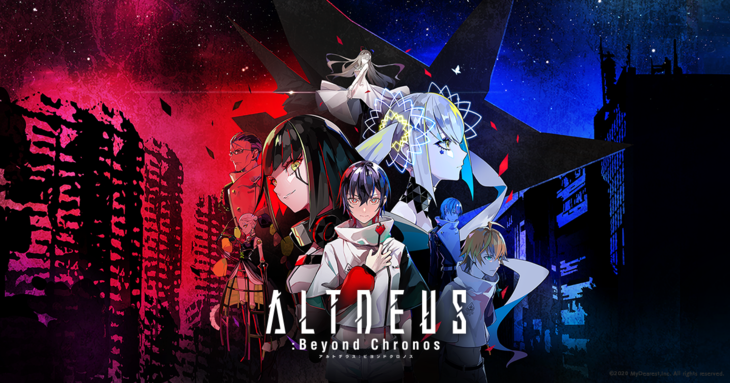
Unique experiences are hard to find, especially in the VR realm. Enter ALTDEUS: Beyond Chronos, a new game in the Chronos Universe series. I have had access to VR for 5 years, but had yet to use it for more than Google Earth VR, until ALTDEUS came along.
It’s a visual novel with levels of interactivity, a great art style, and touching story set in a post apocalyptic world that feels real. While it more than sells a visual novel in VR, it lacks in full motion animations and better voice acting. Anime is scary in a first person view, especially in a world-ending situation in the future. How does the game ultimately stack up? Read on in my ALTDEUS: Beyond Chronos review!
ALTDEUS: Beyond Chronos
Developer: MyDearest Inc.
Publisher: MyDearest Inc.
Platforms: Windows PC (Reviewed), PlayStation 4
Release Date: April 15, 2021 (PlayStation 4), December 3, 2021 (Windows PC)
Players: 1
Price: $29.99 USD
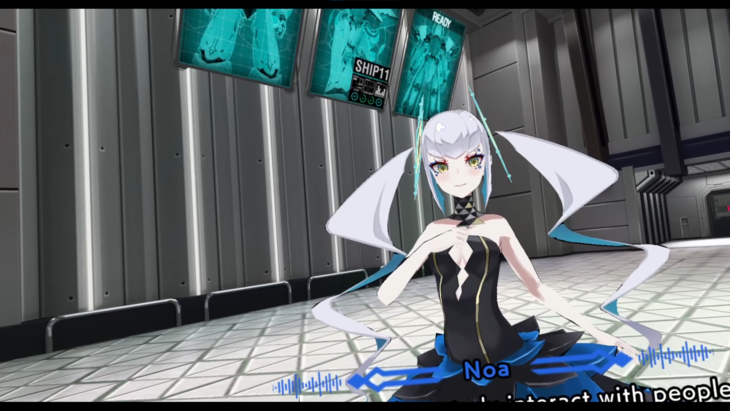
In a future where humanity is driven underground, Augmented Tokyo is the last place humans can call home. Unknown beings called Meteora have taken over the surface of the world, leaving nothing but desolate wasteland in their wake. Thankfully, a military organization named Prometheus has been created to deal with the threats.
Mechas named Makhia were created to deal with the monsters and save humanity. One day Chloe, who pilots a Makhia, is tasked to be a bodyguard for Coco, becoming her best friend. After spending time with Coco and learning emotions, her sudden disappearance makes Chloe distant and cold.
2 years later, you are now in the constant struggle with Meteora and your dreams of Coco every night. The world underground is filled with advertisements with “layers” that can be toggled on or off from view, as well as the people. Mentally, everything is congesting Chloe and her outlook on life, despite being a doll.
Story wise, it’s a conversation of what’s a reflection of the real world, and how humanity has proceeded through 200 years. Sometimes preachy, it immerses you in the world at large through the lens of Chloe. The strongest and arguably the most important element of this game is it’s story, which is filled with emotions.
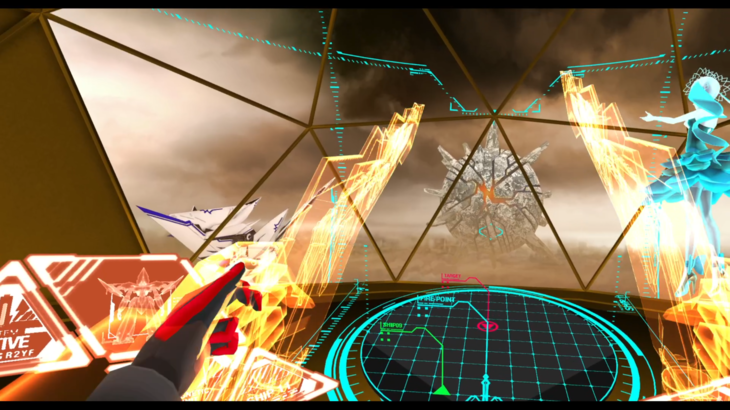
Through an invention called “Libra,” players can make choices that will change the story based off of responses from Chloe. Branching story elements make for a replayable experience, where each choice deals a different outcome and response. Different replies will give you an opportunity before selection to see which stats are affected.
Using this to you advantage will progress the story in a way that could be different than you initially wanted. You can always use your Sphere to go to a scene selector, to either track progress, or play past events. Beyond the choices you make, you will “semi” pilot your Makhia by using prompts to touch, and hand motions to control weapons.
When piloting your Makhia, Noa sings in the cockpit to control systems, but not weapons. Occasionally, Noa performs concerts for the people underground as an idol. Additionally, the songs being sung fit perfect for a performance of an idol that has audio in English and Japanese. It’s an added splash of gameplay that makes it stand out a bit more from just being a visual novel.
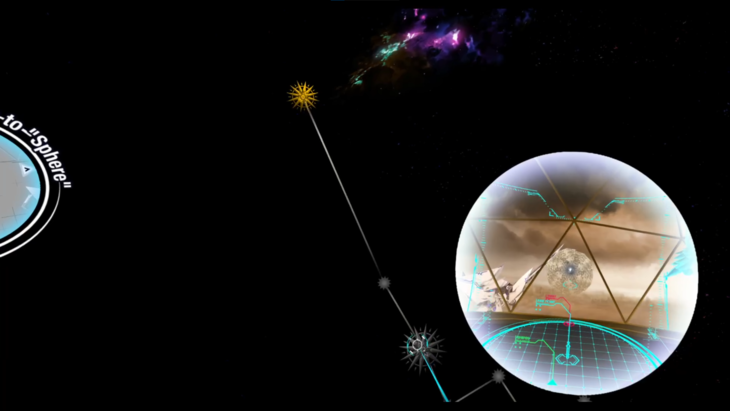
On top of the great story, the graphics are very clean due to it’s dystopian nature. It’s an anime-styled game, which takes direction from LAM, who designed every character in the story. Even so, animations during scenes are sometimes stiff, pivoting and limited like animatronics.
Characters, like their creator intended, have bright colors palettes and very unique, distinct eyes. Easily seeing everything anime in a scope is interesting, especially since the style translates great to 3D. Environments are, again, dystopian by nature; where everything is usually smooth and precise.
A city with multiple ads (some of real world companies) litter the streets, that are also filled with pixel characters from distances. Other environmental items such as flowers and even the Makhias themselves are still detailed well. Needless to say, this story and their locations in VR are immersive, as they’re meant to be. Being in an anime world like ALTDEUS is scary, and it does a great job of setting it up.
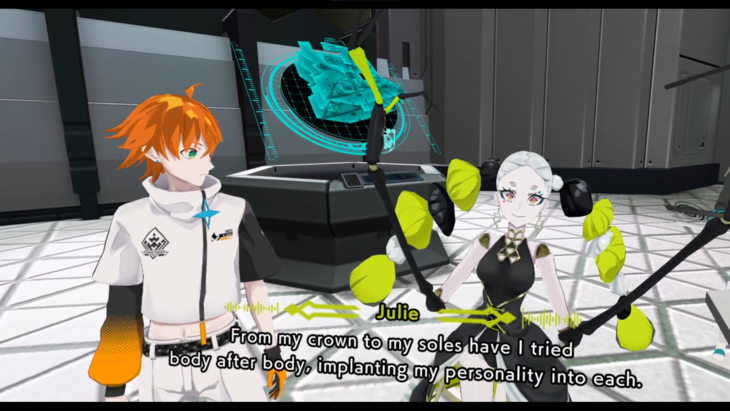
One of the smallest issues is the voice acting for the English cast. They felt phoned in to some extent, and somehow felt mismatched from their Japanese counterparts. It wasn’t terrible, but it seemed very dull for certain characters.
Walking from locations gives the same typical stepping sounds from visual novels, so nothing too unique. Other distant sounds are also normal, but atmospheric in places like the city with crowd sounds. Battling against Meteora has impressive bass, and impact sounds against your Makhia were immersive; and I loved every bit of it.
Audio isn’t it’s strong point, but it doesn’t necessarily come off as lazy by any means. I think that it isn’t completely important, but still needs to hold some weight to it’s immersion. Probably being one of the biggest flaws, it could be better.
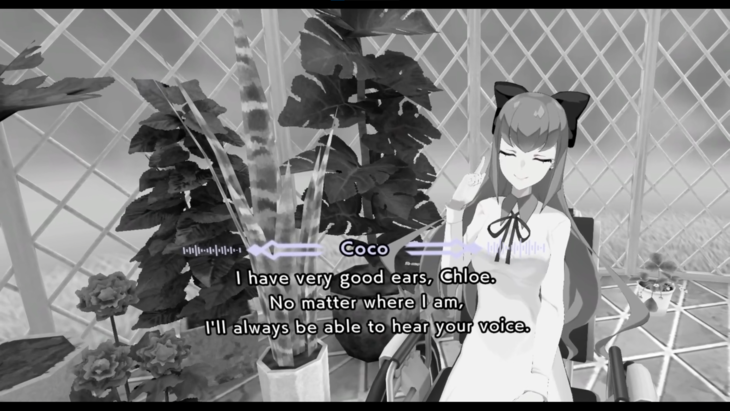
ALTEDEUS: Beyond Chronos is a beautifully crafted game, that can and should be experienced in VR. Being a part of an anime setting, and experiencing everything on a personal scale was intriguing. The polish and detail is absolutely there, and works out amazingly.
The game itself is playable in English or Japanese, and has plenty of dialogue, with some decent voice-over work. Visuals are all in style with the characters, the world at large, and the empty feeling of being the only hope of humanity. Everything works out, and is in an excellent state for VR.
ALTDEUS: Beyond Chronos was reviewed on Windows PC using a copy provided by MyDearest, Inc. You can find additional information about Niche Gamer’s review/ethics policy here.